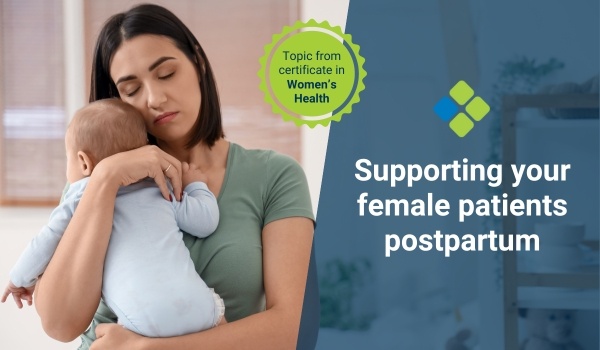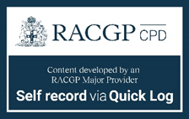Supporting your female patients postpartum
Read how GPs can provide holistic physical and mental healthcare for women postpartum, including initial postpartum visits and the six-week check.

HealthCert Education
The postpartum period (defined as the period from delivery up to six weeks) can be particularly challenging for women. Following birth and immediate postpartum care, at least three additional postnatal contacts are recommended: between 48 and 72 hours, between 7 and 14 days, and during week six after birth. While midwifery colleagues often make early contacts, the "six-week check" is usually performed by the general practitioner.
Initial postpartum visit
At the first postpartum visit, it is essential to ascertain the pregnancy and birth history. The clinician should ask about any pregnancy complications, mode of delivery, and any immediate postnatal issues. This allows the woman to debrief about her experience and address any concerns.
The practitioner should specifically ask about vaginal blood loss, urinary and bowel function, pain, and if the woman is breastfeeding.
It is essential to understand that physical recovery can vary greatly, particularly if the birth has been via caesarean or there have been complications or comorbidities.
Physical examination is also essential. Vital signs should be performed, noting any signs of anaemia, infection or illness. The abdomen should be examined, fundal height and involution should be noted, and any caesarean scar should be assessed. A breast examination should also be performed, assessing for any signs of mastitis or nipple issues. Depending on the mode of delivery, examination of the vagina and perineum may also be warranted.
Specific conditions such as gestational diabetes, hypertension, and thyroid disorders may require specific follow-up, such as blood tests.
Six-week check
The six-week check is an ideal opportunity for health promotion. If due, the practitioner should offer cervical screening, as this can be performed at the six-week check. The importance of gradually returning to physical activity, maintaining a healthy diet, and managing tiredness should be discussed.
The practitioner should be prepared to ask about mental health. "Baby blues", feelings of sadness and tearfulness, are common and usually subside within the first two weeks. Sleep, relationship dynamics, and anxiety can all contribute to postpartum mental health. Postpartum depression (PPD) affects up to 1 in 7 women and can significantly affect the woman's ability to function. Tools such as the Edinburgh Postnatal Depression Scale (EPDS) are particularly useful in screening for depression. Women with signs of PPD should be offered and supported with early interventions such as support groups, counselling, or antidepressant medication.
Finally, it is essential to discuss contraception, as conception can occur as soon as three weeks following delivery. Progestogen-only methods can be started immediately postpartum, whereas initiation of other methods (e.g. combined hormonal contraceptives or intrauterine devices) must be delayed.
Support for new mothers
New mothers often have access to a range of supports, which may include community midwifery services, postnatal support groups, exercise classes, breastfeeding advice, and social support. The general practitioner needs to be aware of resource availability in the local area and how to signpost or refer.
It is essential to recognise that no woman's postpartum journey is the same, and the general practitioner should aim to be approachable and provide holistic and individualised care to support both mother's and child's long-term health.
Dr Samantha Miller, MBChB
Learn more about this topic in the HealthCert online Professional Diploma program in Women's Health
Read another article like this one: Identifying causes of unusual vaginal discharge
Engaging with this blog can help meet your annual
|
|
|
• Milroy, T., & Frayne, J. (2022). Postnatal care: The general practitioner visit. Australian journal of general practice, 51(3), 105–110. https://doi.org/10.31128/AJGP-02-21-5835
• Gunn, J., Lumley, J., & Young, D. (1998). The role of the general practitioner in postnatal care: a survey from Australian general practice. The British journal of general practice: the journal of the Royal College of General Practitioners, 48(434), 1570–1574. https://www.ncbi.nlm.nih.gov/pmc/articles/PMC1313219/
• World Health Organisation (WHO). WHO recommendations on maternal and newborn care for a positive postnatal experience (2022). https://www.who.int/publications/i/item/9789240045989
• Mughal, S., Azhar, Y., & Siddiqui, W. (2022). Postpartum Depression. StatPearls.
• J. L. Cox, J.M. Holden, R. Sagovsky (1987) The Edinburgh Postnatal Depression Scale (EPDS). British Journal of Psychiatry (1987), 150, 782-786. https://downloads.aap.org/AAP/PDF/Postnatal%20Depression%20Scale.pdf

 1800 867 1390
1800 867 1390

-1.jpg)
.jpg)
.jpg)



